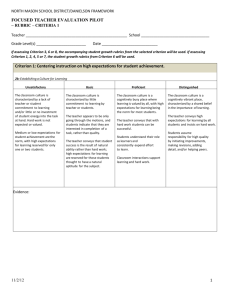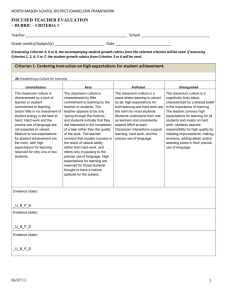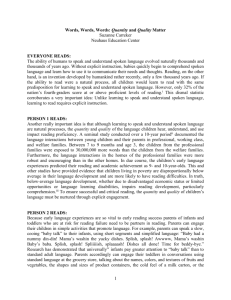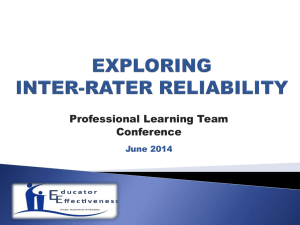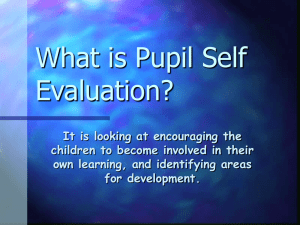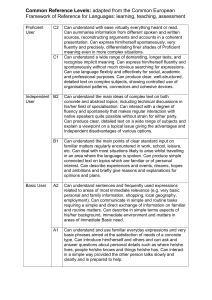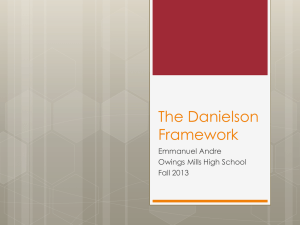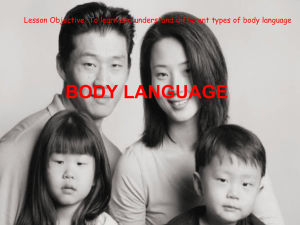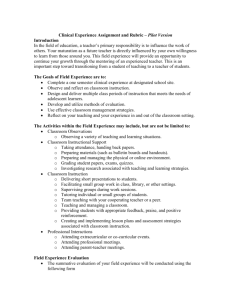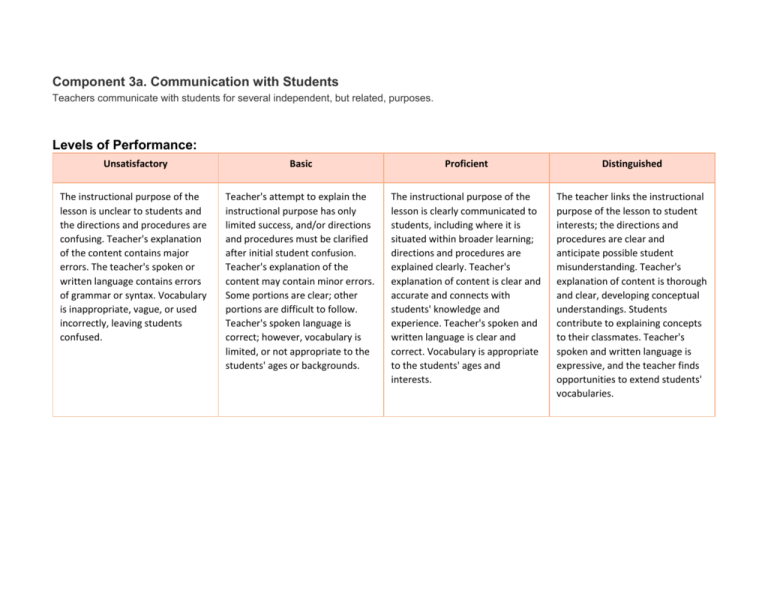
Component 3a. Communication with Students
Teachers communicate with students for several independent, but related, purposes.
Levels of Performance:
Unsatisfactory
Basic
Proficient
Distinguished
The instructional purpose of the
lesson is unclear to students and
the directions and procedures are
confusing. Teacher's explanation
of the content contains major
errors. The teacher's spoken or
written language contains errors
of grammar or syntax. Vocabulary
is inappropriate, vague, or used
incorrectly, leaving students
confused.
Teacher's attempt to explain the
instructional purpose has only
limited success, and/or directions
and procedures must be clarified
after initial student confusion.
Teacher's explanation of the
content may contain minor errors.
Some portions are clear; other
portions are difficult to follow.
Teacher's spoken language is
correct; however, vocabulary is
limited, or not appropriate to the
students' ages or backgrounds.
The instructional purpose of the
lesson is clearly communicated to
students, including where it is
situated within broader learning;
directions and procedures are
explained clearly. Teacher's
explanation of content is clear and
accurate and connects with
students' knowledge and
experience. Teacher's spoken and
written language is clear and
correct. Vocabulary is appropriate
to the students' ages and
interests.
The teacher links the instructional
purpose of the lesson to student
interests; the directions and
procedures are clear and
anticipate possible student
misunderstanding. Teacher's
explanation of content is thorough
and clear, developing conceptual
understandings. Students
contribute to explaining concepts
to their classmates. Teacher's
spoken and written language is
expressive, and the teacher finds
opportunities to extend students'
vocabularies.
Critical Attributes for Component 3a. Communication with Students
Unsatisfactory
At no time during the lesson
does the teacher convey to
the students what they will
be learning.
Students indicate through
their questions that they are
confused as to the learning
task.
The teacher makes a serious
content error that will affect
students understanding of
the lesson.
Students indicate through
body language or questions
that they dont understand
the content being presented.
Teachers communications
include errors of vocabulary
or usage.
Vocabulary is inappropriate
to the age or culture of the
students.
Basic
The teacher refers in passing
to what the students will be
learning, or it is written on
the board with no
elaboration or explanation.
Teacher clarifies the learning
task so students are able to
complete it.
The teacher makes no serious
content errors, although may
make a minor error.
Vocabulary and usage are
correct but unimaginative.
Vocabulary may be too
advanced or juvenile for the
students.
Proficient
The teacher states clearly, at
some point during the lesson,
what the students are
learning.
When asked by an observer,
students can state what they
are learning.
Students engage with the
learning task, indicating that
they understand what they
are to do.
The teacher models the
process to be followed.
Teacher checks for student
understanding of the learning
task.
The teacher makes no
content errors.
Teachers explanation of
content is clear, using
appropriate language.
Most students seem to get it.
Vocabulary and usage are
correct and completely
suited to the lesson.
Vocabulary is appropriate to
the students ages and levels
of development.
Patent Pending. Copyright 2015 ASCD for Danielson. All Rights Reserved
Distinguished
In addition to the characteristics
of "proficient,"
The teacher points out
possible areas for
misunderstanding.
Teacher explains content
clearly, using metaphors and
analogies to bring content to
life.
All students seem to
understand the presentation.
The teacher invites students
to explain the content to the
class, or to classmates.
Teacher uses rich language,
offering brief vocabulary
lessons where appropriate.
Element Rubric: Expectations for learning for Component 3a. Communication with Students
Elements
Expectations for learning
Unsatisfactory
Teacher's purpose in a
lesson or unit is unclear to
students.
Basic
Teacher attempts to
explain the instructional
purpose, with limited
success.
Proficient
Teacher's purpose for the
lesson or unit is clear,
including where it is
situated within broader
learning.
Distinguished
Teacher makes the
purpose of the lesson or
unit clear, including where
it is situated within
broader learning, linking
that purpose to student
interest.
Patent Pending. Copyright 2015 ASCD for Danielson. All Rights Reserved.
Element Rubric: Directions and procedures for Component 3a. Communication with Students
Elements
Directions and procedures
Unsatisfactory
Teacher's directions and
procedures are confusing
to students.
Basic
Teacher's directions and
procedures are clarified
after initial student
confusion.
Proficient
Teacher's directions and
procedures are clear to
students.
Patent Pending. Copyright 2015 ASCD for Danielson. All Rights Reserved.
Distinguished
Teacher's directions and
procedures are clear to
students and anticipate
possible student
misunderstanding.
Element Rubric: Explanations of content for Component 3a. Communication with Students
Elements
Explanations of content
Unsatisfactory
Teachers explanation of
the content is unclear or
confusing or uses
inappropriate language.
Basic
Proficient
Distinguished
Teachers explanation of
the content is uneven;
some is done skillfully, but
other portions are difficult
o follow.
Teachers explanation of
content is appropriate and
connects with students
knowledge and
experience.
Teachers explanation of
content is imaginative and
connects with students
knowledge and
experience. Students
contribute to explaining
concepts to their peers.
Patent Pending. Copyright 2015 ASCD for Danielson. All Rights Reserved.
Element Rubric: Use of oral and written language for Component 3a. Communication with
Students
Elements
Use of oral and written
language
Unsatisfactory
Basic
Proficient
Distinguished
Teacher's spoken language
is inaudible, or written
language is illegible.
Spoken or written
language contains errors
of grammar or syntax.
Vocabulary may be
inappropriate, vague, or
used incorrectly, leaving
students confused.
Teacher's spoken language
is audible, and written
language is legible. Both
are used correctly and
conform to standard
English. Vocabulary is
correct but limited or is
not appropriate to the
students' ages or
backgrounds.
Teacher's spoken and
written language is clear
and correct and conforms
to standard English.
Vocabulary is appropriate
to the students' ages and
interest.
Teacher's spoken and
written language is correct
and conforms to standard
English. It is also
expressive, with wellchosen vocabulary that
enriches the lesson.
Teacher finds
opportunities to extend
students' vocabularies.
Patent Pending. Copyright 2015 ASCD for Danielson. All Rights Reserved.

